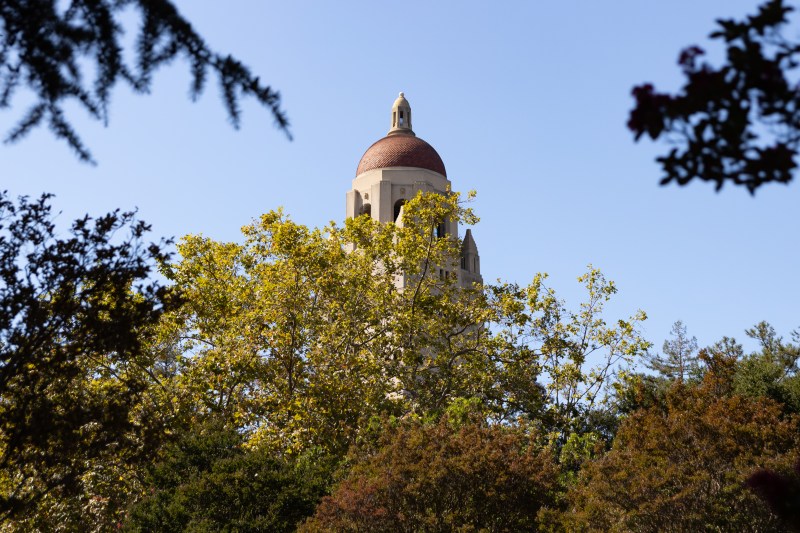President Richard Saller addressed more than 275 members of the Stanford Jewish Alumni Network (SJAN) in a virtual town hall on Nov. 16, following community calls for a clear denouncement of Hamas from the University. Vice President of Alumni Affairs and Stanford Alumni Association President Howard Wolf facilitated the meeting.
The town hall comes after an Oct. 24 letter written by a group of Jewish alumni dissatisfied with the administration’s response to Hamas’ Oct. 7 attack on Israel. The letter was sent to Saller and Provost Jenny Martinez with signatures in support from more than 2,600 parents, students, teachers, faculty, alumni and other community members.
They wrote in the letter that without an immediate and thorough condemnation of Hamas, as well as antisemitism on campus from the administration, signees will cease donations to Stanford and encourage the same from other individuals and entities.
Concerns stem from multiple antisemitic incidents on campus, including reports of a COLLEGE lecturer targeting Jewish students and labeling them as “colonizers,” students marching with posters displaying anti-Israel sentiment such as “From the River to the Sea, Israel will be Arab” and students tearing down flyers featuring Jewish hostages. On Nov. 9, swastikas were found on whiteboards in Roble dorm, the third reported case of swastikas on campus in the past month.
In a statement to The Daily following the town hall, Saller emphasized the meeting’s importance.
“The concerns of the Jewish alumni community need to be heard. I will hold a similar meeting with Muslim alumni and make the point that our actions are aimed at reducing Islamophobia as well as antisemitism on campus,” he wrote.
During the meeting, Saller highlighted the implementation of two campus initiatives: a new Antisemitism, Bias and Communication Subcommittee and a new Muslim, Arab and Palestinian Communities Committee.
According to SJAN co-president and founding member Shelley Hebert, Saller was asked whether Jewish people are included in the University’s Diversity, Equity, Inclusion & Belonging (DEIB) programming.
Saller confirmed after the meeting in his statement to The Daily: “Yes, it [DEIB] does include programs that include Jewish people.”
Alumni have also expressed concerns around how decisions are being made in regards to legal standards surrounding lines between protected and unprotected speech. Saller said he was guided by the Leonard Law in determining what speech can be subject to disciplinary action, and that Stanford has hired an outside law firm for legal advice regarding free speech issues.
SJAN member Kfir Gavrieli ’04, M.S. ’05, MBA ’08 was among the alumni who drafted the letter to Saller and Martinez. Gavrieli said that he would like the University to use the International Holocaust Remembrance Alliance (IHRA) definition of antisemitism, and feels that the administration’s lack of response has enabled antisemitism.
“They can’t on the one hand say we acknowledge there’s a problem with antisemitism and not change the framework through which they deal with it.” Gavrieli told The Daily. “We need structural change. And instead it feels like they’re hiding behind legal definitions and platitudes about free speech and intellectual debate.”
The U.S. Department of Education (DOE) developed its definition of antisemitism based on the IHRA definition. In 2018, the DOE’s Office of Civil Rights used the State Department’s definition of antisemitism to enforce Title VI of the Civil Rights Act to protect Jewish college students from antisemitism.
Jewish alumnus Jason Sugarman ’94 said that the root of issues on campus, including antisemitic speech, extends beyond intellectual disagreement through respectful discourse.
“I feel like it’s more of a pure discriminatory process,” Sugarman said.
Also frustrated by the University’s response, Rabbi Jessica Kirschner, Executive Director of Stanford Hillel, wrote in an email to The Daily about the historical prevalence of antisemitism on campus.
“Antisemitism has been a problem on this campus for decades. What we’ve seen in the last five weeks is a particularly noxious emission of a poison that has been brewing for a long time,” Kirschner wrote.
“I appreciate that this administration has started to take it seriously, but there is a long way to go,” Kirschner wrote. “Though a minority, we are essential to the fabric of Stanford, and we are not going anywhere.”
Gavrieli described the overall response from Jewish alumni who attended the town hall as consistent with the disappointment and frustration many had felt prior to the meeting.
“People in our community feel like this was done to placate us and to try to deflect from what actually needs to be done,” Gavrieli said. “We’re very focused on what real, tangible actions will be taken.”
According to Gavrieli, “Stanford is lagging far behind other universities that have made stronger statements publicly and taken initial decisive steps towards addressing the antisemitic problems on their campuses.”
He extended his outreach to current Jewish students and encouraged them to “use their voice and have the courage to make a difference in this [historic] moment.”
“Every one of us should be able to look back on this time and know that we did everything we could to create meaningful change,” Gavrieli said.
Hebert said she hoped for Jewish students to engage in the SJAN network and quoted from the Talmud: “All Israel are responsible for one another.”
“If I had to say something to Stanford students on campus today: We are with you. We are watching. We care,” Hebert said.
“We will continue to focus on your safety, your wellbeing and your rights to an education that does not marginalize, demonize or threaten you as a Jewish or Israeli student at Stanford.”
